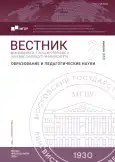Educational Neuroscience in a Transdisciplinary Dimension
- Authors: Lebedeva N.V.1, Kraeva A.G.2
-
Affiliations:
- Plekhanov Russian University of Economics
- Ulyanovsk State University
- Issue: No 3 (852) (2024)
- Pages: 46-51
- Section: Pedagogical Studies
- URL: https://bakhtiniada.ru/2500-3488/article/view/306316
- ID: 306316
Cite item
Abstract
The study of human cognitive abilities through the prism of naturalistic and culture-centric foundations justifies the advisability of including neuroeducation in the transdisciplinary locus of brain research. The purpose of the article is to show how the transdisciplinary revolution affected educational technologies and how modern neuroscience interpreted the key problems of education, as well as to identify the interface between the learning process and artistic cognitive practice.
About the authors
Natalya Vasilievna Lebedeva
Plekhanov Russian University of Economics
Author for correspondence.
Email: Lebedeva1512@yandex.ru
Doctor of Pedagogical Sciences, Associate Professor
Professor of the Department of Political Analysis and Social and Psychological Processes
Alexandra Gennadievna Kraeva
Ulyanovsk State University
Email: kraevalex@list.ru
PhD of Philosophy, Associate Professor
Associate Professor of the Department of Psychology and Pedagogy
References
- Бажанов В. А. Социум и мозг: биокультурный со-конструктивизм // Вопросы философии. 2018. № 2. С. 78-88. EDN: YSHDKT
- Князева Е. Н. Трансдисциплинарные исследования в гуманитарных науках // Вестник Томского государственного педагогического университета. 2011. № 10. С. 193-201. EDN: OJQDNT
- Hook C. J., Farah M. J. Neuroscience for educators: what are they seeking, and what are they finding? // Neuroethics. 2013. Vol. 6 (2). doi: 10.1007/s12152-012-9159-3 EDN: YZNOGE
- Клементович Н. П., Леванова Е. А., Степанов В. Г. Нейропедагогика: новая отрасль научных знаний // Педагогика и психология образования. 2016. № 2. С. 8-17. EDN: WIRKVL
- Лебедева Н. В. Нейроандрагогика - модный тренд или научная область обучения взрослых по законам мозга? // Высшее образование сегодня. 2023. № 5. С. 18-22. EDN: UMOJVA
- Zatorre R. Music, the Food of Neuroscience? // Nature. 2005. Vol. 434. P. 312-315. EDN: XSZXQN
- Lamb R. L. Artificial Intelligence and Sensor Technologies the Future of Individualized and Differentiated Education // Global Journal of Intellectual and Developmental Disabilities. 2023. Vol. 11. P. 1-3.
- Краева А. Г. Роль интонационно-слуховых паттернов в развитии когнитивных способностей человека // Вестник Тверского государственного университета. 2020. №1(51). С. 16-31.
- Кузьмина Ю. В. Интуитивное чувство числа: проблемы измерения и контроль визуальных свойств // Теоретическая и экспериментальная психология. 2018. № 1 (11). С. 51-66. EDN: UVQFTI
- Elouafi L., Lotfi S., Talbi M. Report in Neuroscience and Education: Experiment of Four Neuropedagogical Methods // Education Sciences. 2021. Vol. 11. URL: https://files.eric.ed.gov/fulltext/EJ1307326.pdf (дата обращения: 07.04.2024).
- Oudeyer P.-Y., Gottlieb J., Lopes M.Intrinsic motivation, curiosity, and learning: The oryand applications ineducational technologies // Progressin Brain Research. 2016. Vol. 229. Р. 257-284.
Supplementary files









